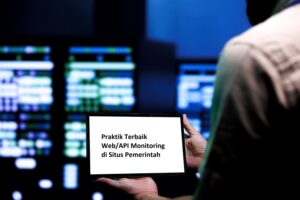As web and mobile app usage soars, governments at all levels are increasingly turning to these channels to improve communication and responsiveness to the public. By using API monitoring, governments empower developers to implement new technologies that help the public even more.
Whether it’s the use of websites or mobile apps, governments can now engage and provide useful information to the public. APIs make government services more transparent, responsive and effective, making it more satisfying for the public.
API Integration in Government
When using APIs, the government can integrate databases from various sources to simplify operations. APIs allow government institutions to create more modern and convenient website services, create mobile applications, and deliver transparent services.
Due to the vast geography of Indonesia, it is only natural that there are still many government institutions that do not or have not fully utilized APIs on their websites. As a result, the data presented on the website is not presented in real-time. In the future, it is expected that the use of APIs will be even more widespread.
Usefulness of Web/API Monitoring for Government Websites
The shift of government performance to be faster, responsive and modern is very important in various government institutions to develop the best service. What are the uses of web/API monitoring for government websites? Here are some of them:
1. Informing and Interacting with the Public
By using effective and reliable APIs, the government can offer new ways for the public to use and interact with government records and services. For example, if in the past making a passport had to be done directly at the immigration office so that the public had to queue all day, then now the queuing process and even making it can be done online.
There are many other examples besides the passport-making process. The government’s bureaucratic process, which once seemed convoluted and very complex, is now much more accessible to the public. Anyone who needs and has an interest will find it easier to take care of various documents. The Director General of Immigration and other government institutions can utilize the intelligence of external developers in improving their website services.
2. Streamline Government Operations
Thanks to the use of websites that are continuously monitored with APIs, the benefits are not only felt by the public, but also the human resources themselves, in this case government officials. As an example for health services that are now completely digital, even medical records are now available digitally and can be accessed through websites and applications for interested parties.
The existence of digital medical records greatly facilitates hospital staff in tracking patient medical records. In public hospitals, the number of patients in a day is certainly not small. If you have to search for medical records one by one, it will certainly take a long time and hamper staff work. There may be human errors, such as recording errors, missed records, and others. Digital medical records will reduce and eliminate errors. Digital records make staff work easier and smoother.
3. Automation
The use of API technology makes the data collection process and workflow in various government institutions simpler because many tasks are automated. Various tasks are done by computers, so human resources can focus on other tasks that require cognitive abilities.
4. Presenting Data that is Easily Accessible
API technology is able to integrate databases from various sources and distribute data to the pathways that need it. This method makes it very easy for people to access the data they need. In the past, the government was not transparent, but now the sentiment is different. Government institutions are becoming more transparent and satisfying their services to the public.
5. Personalization
By utilizing APIs, it allows government content and services to be personalized according to each target audience. People can more easily access data, services, and content that are more relevant to them. For example, based on location, age, gender, and others.
6. Increase Data Coverage
APIs allow various information to be distributed easily by partners, other divisions within the same institution, and other government institutions. The scope of data provided by the government becomes wider.
7. Easy Adaptation
API technology can be easily adapted by its developers, so that government operations can integrate it if there are new technological developments. In addition, it is easy to use, both for the government and the public.
API Development and Integration Challenges for Government
Most government departments and agencies that have been in existence for a number of years have, over time, inevitably implemented technological advancements, computer systems, data sources, and eventually the use of websites and applications to solve various operational and organizational challenges. Legacy systems become increasingly inefficient as they age and fail to support the public interest amidst modern technological developments.
Government institutions that still rely on legacy systems often end up running into problems when trying to add new services and software, including the use of APIs. Sometimes this problem can be solved by point to point integration between existing systems. But in the end, this particular integration creates a fragile dependency, making the system more complicated and more prone to fail at the slightest change.
Another challenge the government faces in developing API technology in government services is the lack of access to effective tools for designing, testing, managing and monitoring them. In addition, without the support of dynamic developers who have a lot of insight into API design and features, APIs will be more difficult to promote, let alone to be widely used by the public.
Solutions for API Usage in Government Sites
To overcome the above challenges, it is very important to develop a well-designed and well-crafted API so that it can be adopted easily and widely. Use a trusted and reliable Web/API monitoring service such as Netmonk, a startup that offers a more powerful and easy-to-use network monitoring solution.
Initiated by young Indonesians, Netmonk comes with its flagship product, Netmonk Prime which comes with a web/API monitoring module that ensures company service functions can be available and accessed by users. API monitoring from Netmonk Prime is Proactive Maintenance, so that notifications can be activated in real time. The monitoring process can be done easily from anywhere and anytime. Just try the Netmonk Prime service right now!


